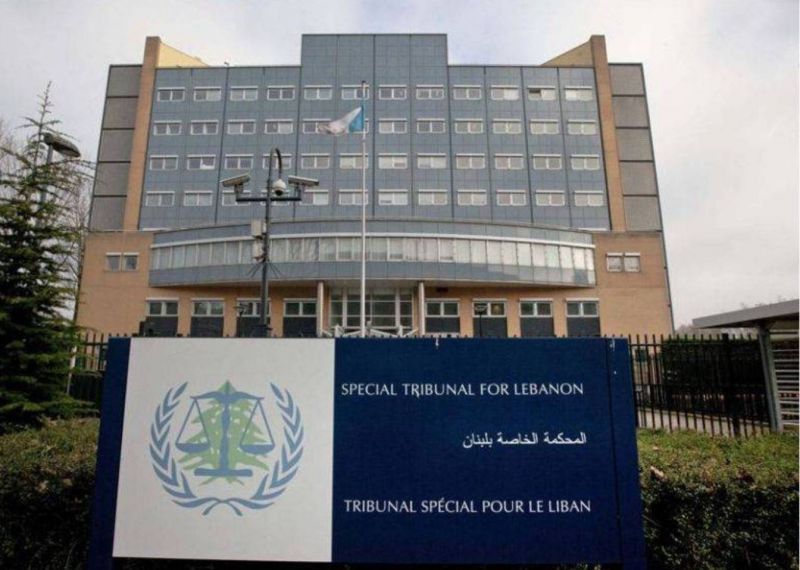
The headquarters of the Special Tribunal for Lebanon (STL) near The Hague. (Credit: AFP archives)
Almost 17 years after its establishment through UN Security Council Resolution 1757, adopted in May 2007 under Chapter VII, and some 15 years after it began its work in March 2009, the Special Tribunal for Lebanon (STL) which has its seats on the outskirts of The Hague in the Netherlands, closed its doors on Dec. 31, 2023.
Tasked with investigating the Feb. 14, 2005 assassination of former Prime Minister Rafik Hariri, which left 22 people dead and 226 injured, the STL ceased its activities due to funding shortage.
Both the donor countries, which provided 51 percent of the $1,200,000,000, needed to run the court, and Lebanon, which footed 49 percent of the bills, have ceased to provide the funds needed to continue the judicial procedure.
In April 2021, the STL Court of Appeal sentenced Salim Ayyash to life imprisonment, and in June 2022, it doled the same sentence on Hassan Habib Merhi and Hussein Hassan Oneissi. All three men are presumed Hezbollah members.
The STL also declared itself competent to examine three related cases, namely the Oct. 1, 2004 assassination attempt against then-MP Marwan Hamadeh for the Progressive Socialist Party (PSP), the June 2005 assassination of Georges Hawi, former Secretary General of the Lebanese Communist Party, and the July 2005 assassination attempt against former minister Elias Murr.
Will the STL’s decisions be followed up on after its closure while Hariri’s assailants remain at large and the related cases remain undecided?
What will become of the other cases the STL took on, like the assassinations of journalist Samir Kassir (June 2005), former MP and CEO of Annahar, Gebran Tueni (Dec. 12 2005), Internal Security Forces (ISF) intelligence officers Wissam Eid (Jan.25, 2008) and Wissam al-Hassan (Oct.19, 2012), and the assassination attempt on former MP and LBCI talk show host and journalist May Chidiac (Dec. 25, 2005)?
L’Orient-Le Jour asked the former vice-president of the STL, Ralph Riachi, these questions.
Q- Now that the STL has been closed, could the sentence against those behind the assassination of Rafik Hariri still be carried out?
A- Although the STL has ceased its activities, its decisions remain in force. The Tribunal has a legal existence, since Resolution 1757, which created it, has not been repealed. The United Nations will therefore have to set up an interim body to carry out the residual functions of the SLT, for which it remains competent. As a precedent, the UN created an international mechanism in 2011 to carry out the functions of the International Criminal Tribunal for the former Yugoslavia (ICTY) and the International Criminal Tribunal for Rwanda (ICTR) after their closure.
The tribunal to be set up for Lebanon, unlike the SLT, would not be costly. It would be responsible for supervising the execution of the guilty parties’ sentences and their arrest warrants, in particular by putting pressure on the national and international authorities to apprehend them. In the event that the Lebanese state or other states locate and arrest the criminals, in accordance with the Interpol warrants issued against them by the SLT, they will have to hand them over to the residual tribunal, rather than detaining and trying them at the national level. It should be noted that anyone convicted in absentia has the right, if they appear before the court, to have the trial restarted from scratch, or to have it returned to the procedural stage (investigations, first instance, appeal, etc.) that they wish. The tribunal to be set up by the UN will then be responsible for overseeing the procedure to be followed.
Q- What will happen to the cases in which the STL has recognized its competence and the connection with the Hariri case?
A- The STL had begun to study the cases of the assassination attempt against Marwan Hamadeh, Samir Kassir and Gebran Tueni. In 2011, the Tribunal’s Prosecutor issued an indictment, which he transferred to the Pre-Trial Judge, Daniel Fransen. A first hearing was then set for June 2021, but did not take place because the court was already short of funds.
It will be up to the residual mechanism to organize the continuation of the trial, especially since the STL has not decided to relinquish its control over the aforementioned cases. Even a national law passed to allow Lebanon to take over would be invalid. That is true particularly since the Lebanese judiciary cannot take over the competence of the STL, a body created under Chapter VII. In any event, international conventions take precedence over national laws.
Q- What about the cases over which the STL has not declared its competence?
A- Before being submitted to the STL for a ruling on its jurisdiction, these cases had already been referred to the Lebanese judiciary. As long as the UN tribunal has not declared itself competent to handle them, the Lebanese judiciary has the latitude to examine them. The Lebanese government could, if it so wishes, task caretaker Justice Minister Henri Khoury to ask the Prosecutor General at the Court of Cassation [Ghassan Oueidat] to request from the residual international body information, documents and other evidence useful to the local investigations. For the time being, the documents collected by the STL are being archived at the United Nations headquarters, and should later be brought together by the residual tribunal. The public prosecutor at the Court of Cassation could, if he so wished, conduct investigations without waiting for authorization from the United Nations, or for the State to take the initiative.
This article was originally published in French in L'Orient-Le Jour. Translation by Joelle El Khoury.